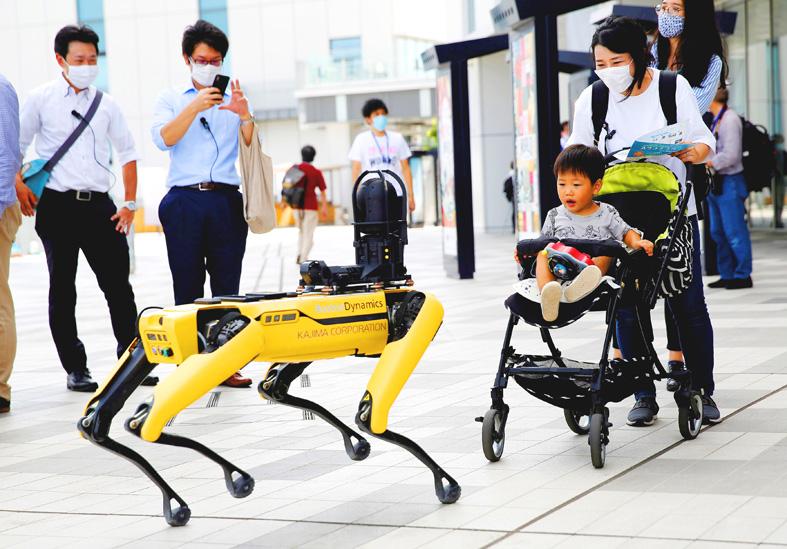Hyundai Motor Group agreed to buy a controlling stake in Boston Dynamics Inc in a deal that values the mobile robot firm at US$1.1 billion.
Hyundai Motor Group, along with some associated companies and chairman Euisun Chung, is to acquire an 80 percent interest in the US robotics company from Softbank Group Corp, leaving the Japanese firm with a 20 percent share, the companies said in a statement on Friday.
South Korean conglomerate Hyundai Motor Group has been beefing up its research in robotics as it expands further into electric and autonomous vehicles.

Photo: Reuters
Carmaker Hyundai Motor Co plans to spend more than 60 trillion won (US$55 billion) in the next five years in these areas to become one of the world’s leading auto manufacturers.
The broader empire is also exploring practical uses for industrial robots.
Other Hyundai entities that would participate include auto-parts maker Hyundai Mobis Co and Hyundai Glovis Co, which provides international and domestic logistics services.
A sale of Boston Dynamics would mark another twist in the trajectory of a company that spun out of the Massachusetts Institute of Technology in the early 1990s and operated independently until Google bought it in 2013. It was sold again in 2017, that time to Softbank.
At times, Boston Dynamics has functioned more like a research organization than a business, churning out machines that are technologically advanced and whimsical, but unprofitable. That includes Spot, a maneuverable dog-like robot.
Videos of its creations regularly rack up millions of views on YouTube, but the company has said it is not currently generating a profit.
Within Softbank, Boston Dynamics formed part of a disparate collection of robotics ventures in the technology firm’s portfolio, including developers of robots for warehouses, restaurants and other industrial applications.
Its staff tripled to 300 people and it moved into new headquarters in a refurbished former postal building in Waltham, Massachusetts, at a cost of US$20 million, a person familiar with the matter said earlier this year.
Late last year, Softbank made a new push to steer the robot maker toward profitability, accelerating an effort that had started under Google.
Hyundai by contrast makes highly practical industrial robots intended for factory use. The group has been developing robotics such as exoskeleton suits that help ease fatigue and prevent injury for factory workers.
It is also working on robots with artificial intelligence that can provide assistance at hotels and in other service sectors.
Chung, who became the group’s chairman in October, has been transforming the conglomerate to introduce more electric vehicle lineups and plans to enter the aerial vehicle market in 2028.
The group is also building an innovation center in Singapore where Hyundai would work on developing artificial intelligence, big data and other technologies to enhance its manufacturing processes, fine tuning the “brains” behind the smarter and more environmentally friendly cars of tomorrow.

Semiconductor shares in China surged yesterday after Reuters reported the US had ordered chipmaking giant Taiwan Semiconductor Manufacturing Co (TSMC, 台積電) to halt shipments of advanced chips to Chinese customers, which investors believe could accelerate Beijing’s self-reliance efforts. TSMC yesterday started to suspend shipments of certain sophisticated chips to some Chinese clients after receiving a letter from the US Department of Commerce imposing export restrictions on those products, Reuters reported on Sunday, citing an unnamed source. The US imposed export restrictions on TSMC’s 7-nanometer or more advanced designs, Reuters reported. Investors figured that would encourage authorities to support China’s industry and bought shares

FLEXIBLE: Taiwan can develop its own ground station equipment, and has highly competitive manufacturers and suppliers with diversified production, the MOEA said The Ministry of Economic Affairs (MOEA) yesterday disputed reports that suppliers to US-based Space Exploration Technologies Corp (SpaceX) had been asked to move production out of Taiwan. Reuters had reported on Tuesday last week that Elon Musk-owned SpaceX had asked their manufacturers to produce outside of Taiwan given geopolitical risks and that at least one Taiwanese supplier had been pushed to relocate production to Vietnam. SpaceX’s requests place a renewed focus on the contentious relationship Musk has had with Taiwan, especially after he said last year that Taiwan is an “integral part” of China, sparking sharp criticism from Taiwanese authorities. The ministry said

US President Joe Biden’s administration is racing to complete CHIPS and Science Act agreements with companies such as Intel Corp and Samsung Electronics Co, aiming to shore up one of its signature initiatives before US president-elect Donald Trump enters the White House. The US Department of Commerce has allocated more than 90 percent of the US$39 billion in grants under the act, a landmark law enacted in 2022 designed to rebuild the domestic chip industry. However, the agency has only announced one binding agreement so far. The next two months would prove critical for more than 20 companies still in the process

CHANGING JAPAN: Nvidia-powered AI services over cellular networks ‘will result in an artificial intelligence grid that runs across Japan,’ Nvidia’s Jensen Huang said Softbank Group Corp would be the first to build a supercomputer with chips using Nvidia Corp’s new Blackwell design, a demonstration of the Japanese company’s ambitions to catch up on artificial intelligence (AI). The group’s telecom unit, Softbank Corp, plans to build Japan’s most powerful AI supercomputer to support local services, it said. That computer would be based on Nvidia’s DGX B200 product, which combines computer processors with so-called AI accelerator chips. A follow-up effort will feature Grace Blackwell, a more advanced version, the company said. The announcement indicates that Softbank Group, which until early 2019 owned 4.9 percent of Nvidia, has secured a